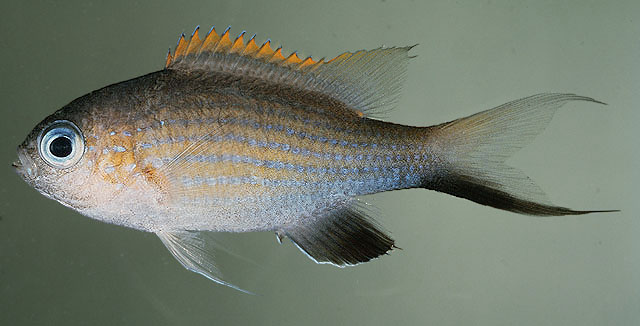| Pomacentridae (Damselfishes), subfamily: Pomacentrinae |
| 6 cm TL (male/unsexed) |
|
reef-associated; depth range 2 - 20 m, non-migratory |
| Pacific Ocean: Taiwan to the Hawaiian and Pitcairn islands, north to the Izu Islands, south to Rowley Shoals (eastern Indian Ocean) and Lord Howe and Rapa islands. |
|
Dorsal spines (total): 12-12; Dorsal soft rays (total): 10-12; Anal spines: 2-2; Anal soft rays: 10-12. Color is alternating blue and yellow stripes. The caudal fin has a broad yellow upper lobe margin and a broad black lower lobe margin. The margin of the spinous portion of the dorsal fin is also yellow; the anal fin is largely black. |
| Adults occur in small to large aggregations in exposed outer reef slopes and rocky inshore reefs (Ref. 3921). Benthopelagic (Ref. 58302). Diet consists of zooplankton, especially copepods (Ref. 3921). Oviparous, distinct pairing during breeding (Ref. 205). Eggs are demersal and adhere to the substrate (Ref. 205). Males guard and aerate the eggs (Ref. 205). |
|
Not Evaluated
(Ref. 96402)
|
| harmless |
|
Recorded from Lanuza Bay (Ref. 104756). |
Source and more info: www.fishbase.org. For personal, classroom, and other internal use only. Not for publication.
Page created by Jen, 05.08.02,
php script by kbanasihan 06/09/2010 ,
last modified by
dsantos, 20/08/10

